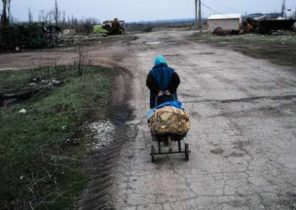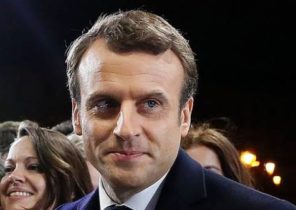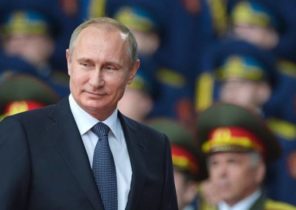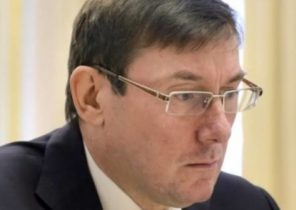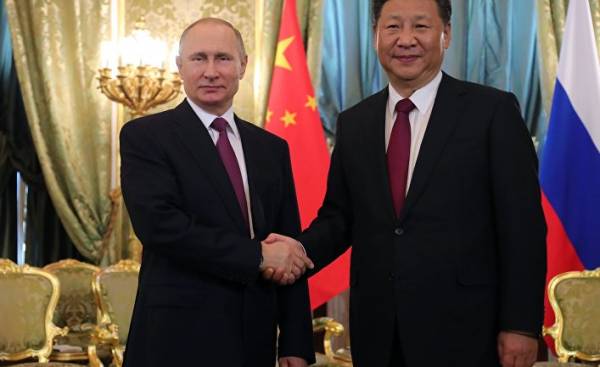
The mechanism and logic of Chinese control over the Internet is not as simple as it might seem at first glance. The list of “stop words” and taboo is constantly changing. Vary and the recommendations of the authorities concerning the content, from complete taboo on a particular subject wishes to “not stick out” urgent issues or to limit their discussion in the network.
Censorship can be permanent, can be introduced temporarily in connection with important global and domestic events or anniversaries (for example, annual peak the attention of the controllers of the Internet falls on June 4, the anniversary of the events in Tiananmen square in 1989). The greatest severity of Internet censorship manifests during party congresses or annual session of vsekitajsky meeting of national representatives.
During the G20 meeting in Hamburg on the Chinese Internet suddenly appeared a new area of special control — when you try to comment on almost any post in the popular social network “wave hotel” (新浪微博), where he mentioned Vladimir Putin, the user is faced with the lock. On the screen appeared the inscription: “This post is forbidden to comment” (此条微博禁止评论). In addition, very often disconnected function repost — these publications it was not possible to share the tape with their friends.
The Chinese image of Putin
First, this oddity drew the attention of the users “wave hotel”. Empirically they found out that the ban on comments does not affect all of the posts that mention Russian President, but only those that can be widely spreading in the Internet. The main was just not the content (it could be completely neutral and harmless), and downloads the the publisher: if it has a sufficient number of friends (thousands), all reprints and note comments about Putin in any case blocked.
The tenth of July this was written on my English site the Financial Times, the eleventh of July, a similar article appeared on Chinese-language site FT. The conclusion of the newspaper: the actions of censorship were the result of the Golden period, which are now in Chinese-Russian relations. As stated in an interview with the FT, the Chinese journalist Cai Senkung (蔡慎坤), Putin was the first foreign leader who has received the privilege of being protected from criticism on the Chinese Internet. Usually, such protection extends only to the top leaders of China.
However, this version was refuted very quickly: by the time of article publication ban on commenting any records associated with Putin, was withdrawn as suddenly as it entered. You can pay attention to the fact that it was forbidden not the publications themselves, and their further spread. In addition, it is not clear what criticism of the President of Russia could expect the supervisors of the Chinese Internet.
Putin to the Chinese audience hero is definitely a positive, in social networks there are several pages of Chinese fans of the Russian President, are vying to publish his remarks, was particularly attracted to tough foreign policy rhetoric, and popular photography. While in the review often heard words of admiration of the physical form of the President and his closeness to the people. Result is a list of the most popular of Putin’s tags (or topics (话题) in terms of “wave hotel”): “I’m the perfect man Putin” (#我和男神普京#), “tough guy Putin” (#硬汉普京#), “the Great Emperor Putin” (#普京大帝#).
The image of Putin with such authority that the Chinese Internet polemicists often attributed to him necessary statements. So, in the midst of territorial disputes between China and Japan over the Diaoyu Islands in the network appeared the invented quote Putin: “Russia has no extra land, in territorial disputes cannot be negotiated, but only war!” (俄罗斯没有一寸土地是多余的!领土争端没有谈判,只有战争!). Now this and other pseudostate attributed to Putin, is once again in Vogue in connection with the aggravation of the situation on the borders of China, India and Bhutan.
Anyway, immediately after the July summit of the G20, any new records which contained the word “Putin” will be free to comment and widely circulated. Consequently, if a ban was some logic, it is not associated with the Sino-Russian relations and even with the personality of the President of Russia, and with what happened in Hamburg.
In favor of this version says that rather critical article about the relationship with Russia is not censored, neither before nor during nor after the “special period” 7-8 July. If speculation Financial Times about the blocking of comments very quickly was cleaned with censorship (the Center for the study of journalism and media, University of Hong Kong, which monitors Chinese Internet), for example, the article on FT Chinese website about contemporary foreign policy of China famous Chinese scientist Dan Yuwen (邓聿文) quietly present in social networks, in blogs and on some news portals in China. Although it is not just a mild criticism of Beijing in the Russian direction, and call for a complete rejection of close relations with Moscow.
Allowed the criticism
Makes sense to elaborate on this publication to figure the allowable level when discussing how foreign policy issues in General and more specific topics — China’s relations with Russia. Dan Yuwen can be attributed to right-wing liberal spectrum of Chinese political thought, but it can not be called dissident or non-systemic intellectual. Recently, the scientist held an official position in the Central party school of the CPC (until 2013, Dan was the Deputy chief editor printed on both newspaper “Suasi, shibao,” 学习时报).
Interestingly, working in the citadel for the training of party cadres, Deng Yuwen was not a Communist, he is a member of one of the “democratic parties” — the Revolutionary Committee of the Kuomintang, and even included in one of the committees of the Central Committee of the RCUS. Deng Yuwen is a senior fellow of one of the Chinese think tanks — the Institute of Chahar (察哈尔学会; The Charhar Institute), cooperating with leading Chinese and foreign media.
In an article for the Chinese website of Financial Times, Deng Yuwen wrote about the need to reform China’s foreign policy, and in this respect he differs little from other Chinese experts on international relations that do not stop to discuss how a rising China should manifest itself in the immediate periphery and on a global scale. The difference in the alignment of priorities and radical proposals. Deng Yuwen in the beginning of his article, he writes about what he stands for system changes as diplomatic thinking and diplomatic practice. Yet, according to experts, Chinese diplomacy in its current form leads to, what in the world is China “feared, but not respected” (畏而不敬).
Offers Dan Yuwen about Russia simple and just very radical — China must abandon the “relations of casinousa” (准同盟关系) and to avoid unnecessary proximity to Russia. The author observes that in modern history, two States have had a particularly strong impact on China — USA and Russia, however, American influence was “active and positive” and Russian — “passive and negative”. Deng Yuwen, not excluding the community of interests of Moscow and Beijing on a tactical basis, warns that closer ties with Russia became a strategy, and created Union or cusious was aimed at countering the United States.
Deng Yuwen leads a long list of claims to Russia. First, it is estimated that in bilateral relations, Moscow continues to play a leading role. Secondly, Russia is struggling to contain China, which is manifested, for example, in the Shanghai cooperation organization. Russia is strongly involved in the SCO of India, whose interest in the organization was small. These efforts, Russia has undertaken with the purpose of containing China.
However, the main danger for China, Deng Yuwen sees the current conflict between Russia and the West. The contradictions between Russia and the United States and the European Union is stronger than the contradictions of China from these global players, and in such a situation, the Sino-Russian Alliance could easily turn China into a pawn in Russia’s confrontation with the West. The common interests of China and Russia do not go to any comparison with common interests of China and the United States, therefore, from the point of view of strategic interests of China, the conclusion of casinousa with Russia has more minuses than pluses, says Deng Yuwen.
Deng Yuwen is the supporters, although his views certainly do not belong to the mainstream, the more they cannot be identified with the official position.
Meanwhile, some disturbing notes about the dangers of being drawn Beijing into a confrontation between Russia and the West in recent times are becoming more frequent, and from the lips of more authority and status of experts. Some experts believe that Russia is increasingly marginalities in the global economy and a partner hardly interesting for China. Others pay attention to the duality of the position of a strategic partner — recognizing the role of Moscow in international Affairs, experts draw attention to the risks they write with the “weakening Russia”. For our topic what is more important — that such opinions the authorities had not suppressed before and now they are not concern ideological censors.
Always in the foreground
A link to an article by Dan Yuwen Financial Times gave in his account “wave hotel” three times, first at three in the morning on Monday 3 July, the same day at 17:25 (Prime-time — when a Chinese scroll through your gadgets, getting ready for dinner) and then a repeat on Saturday 8 July at 20:00 (as the best material of the week). None of these publications has not been blocked, functions, repost and comment also not disconnected. This is unlikely to happened because of carelessness of the administration of the “wave hotel” and censorship. After distributing an article is not just a foreign account, but very influential — Financial Times in the “wave hotel” 1.5 million subscribers. And when you lock comments to posts about Putin on July 7-8, the control bar was much lower — only a thousand subscribers.
The survey of Chinese experts has shown that clarity about the actions of censorship during the summit of “twenty” have not. One of the most authoritative international law experts told me that it is not necessary even to reflect on the logic of the Chinese bureaucracy: “Today, they think there is some danger of undesirable content associated with Putin, then I saw that nothing was happening and refused to ban comments and shares”.
Some experts agreed that the blocking of unwanted comments indicates a high level of Chinese-Russian cooperation and the special nature of the partnership between the two countries, shows the willingness of Beijing not to harm bilateral relations. However, they could not explain why the flash is the interest of censorship the publications of Putin was so short and exactly coincided with the summit of “twenty”.
Earlier, several sources knowledgeable about the practice of control over the Internet, told Chinese online media has been instructed to block personal attacks on the Russian President. What is behind this policy and whether it is hard to say, but the Directive is unlikely to explain the situation described above. Two days in July blocked no attacks, just the information about the person, or rather, its widespread presence on the network.
I think that brings us to the solution. Viewing room chief of the party newspaper “people’s daily” revealed that for all the time of the Hamburg summit, Putin was mentioned in the newspaper only once in the message about the informal meeting of the BRICS group, which was held on the margins of the summit, chaired by XI Jinping.
In the pages of Renmin Ribao was completely absent from one theme, which in early July was in the focus of Russian and world press. We are talking about the first meeting between Vladimir Putin and Donald trump. Chinese “paper number one” completely ignored her — in the days of the G20 was not the slightest mention of the talks between the presidents of Russia and the USA. There was not even a brief informational notes, not to mention your detailed comments.
It seems that to divert from the focus of the audience on the topic of Russian-American talks, was sent illogical at first glance, the actions of the Chinese censors. We can assume why it was done. In the year of the party Congress when commenting on any internal and international developments the focus of attention should be XI, which is the concentration of power has surpassed his two predecessors Hu Jintao and Jiang Zemin.
About the peculiarities of the Chinese reports about the work of the Forum of international cooperation “One belt and one road” we have already written. Planning tactics MediaRecovery for “twenty”, Chinese propaganda organs is fair to assume what the topic will be wearing the most striking and sensational character, and did everything possible so that the talks between Putin and trump is in any case overshadowed the participation of the President of the PRC in the meetings of the G20.
Sensitivity to everything that is associated with the “core” of the Chinese political machine — XI Jinping — has increased dramatically. In China I do not understand why the Russian media began to savor minute delay of the Chinese delegation to the talks between Putin and XI Jinping in Astana on the sidelines of the SCO summit. Then in the hall for negotiations for some time China was represented only by XI Jinping and head of its Secretariat Dean Suasana (丁薛祥). Comic appeal to Putin to XI Jinping — “One soldier!” — scared of the Chinese censors. Everything was done to stop the spread roller in the Chinese network, were removed and all the text retellings of this episode, and the new Internet memes, and popular comments: “isolated”, “how lonely”, “one is boy” (被孤立, 好孤独, 一人作战). The leader, an important point left by associates, not the best picture for the image of XI as a strong leader.
The website of the Chinese Central television on the visit of XI Jinping to Russia and Germany appeared a curious document, in which methodically lists how closely the TV crew reported on important meetings and presidential statements. It’s more like an official report, which apparently had previously sent to higher authorities, but now is the time that loyalty to the leader is required to declare openly and loudly.
